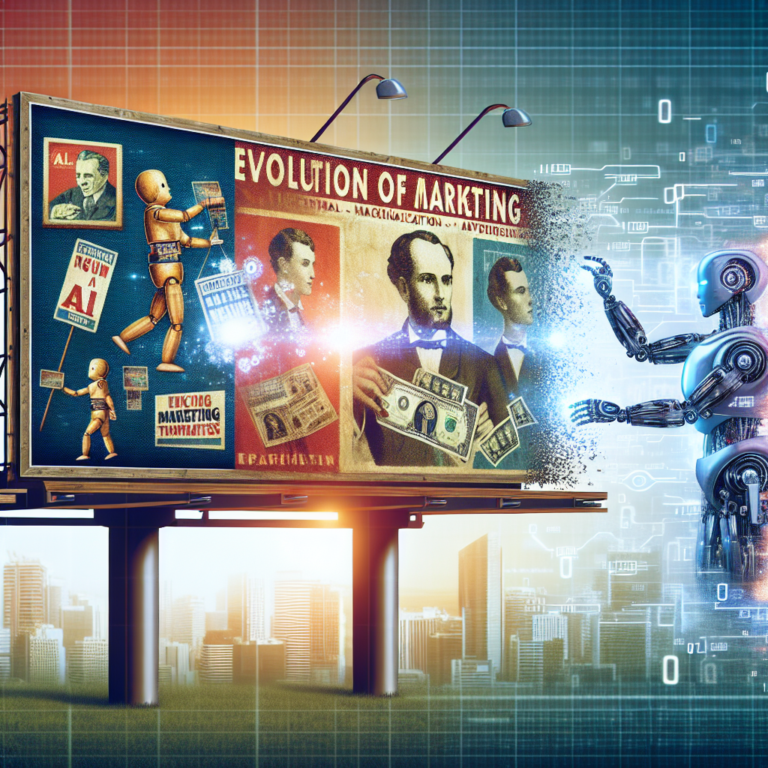Introduction
In recent years, artificial intelligence (AI) has emerged as a powerful tool in the marketing industry, revolutionizing the way businesses connect with their target audience, analyze data, and streamline their operations. From personalized advertising to predictive analytics, AI is reshaping the future of marketing in ways that were once thought impossible.
The Role of AI in Marketing
AI is transforming the marketing landscape by enabling businesses to harness the power of data and technology to create more targeted, personalized, and effective marketing campaigns. With AI-powered tools, marketers can analyze vast amounts of data in real-time, identify trends and patterns, and make data-driven decisions that drive results.
Personalized Marketing
One of the key benefits of AI in marketing is its ability to deliver personalized experiences to consumers. By analyzing customer data and behavior, AI algorithms can create highly targeted and relevant marketing messages that resonate with individual preferences and interests. This level of personalization not only improves engagement and conversion rates but also enhances overall customer satisfaction.
Predictive Analytics
AI-powered predictive analytics tools enable marketers to forecast future trends, behaviors, and outcomes based on historical data. By leveraging machine learning algorithms, businesses can anticipate customer needs, optimize their marketing strategies, and make informed decisions that drive business growth. Predictive analytics also helps marketers identify potential opportunities and risks, allowing them to stay ahead of the competition.
The Benefits of AI in Marketing
AI offers a wide range of benefits to businesses looking to streamline their marketing efforts and improve their ROI. Some of the key benefits of AI in marketing include:
Increased Efficiency
AI automates repetitive tasks, such as data analysis, campaign management, and customer segmentation, allowing marketers to focus on strategic initiatives and creative endeavors. By eliminating manual processes and streamlining workflows, AI helps businesses save time and resources while improving productivity and efficiency.
Enhanced Personalization
AI enables businesses to deliver personalized experiences to consumers at scale, tailoring marketing messages and offers to individual preferences and behaviors. By leveraging AI algorithms, marketers can create hyper-targeted campaigns that drive engagement, loyalty, and conversions. Personalization also helps businesses build stronger relationships with customers and foster brand loyalty.
Improved Decision-Making
AI-powered analytics tools provide businesses with valuable insights and actionable intelligence that inform strategic decision-making. By analyzing data in real-time and identifying trends and patterns, marketers can make informed decisions that drive business growth and profitability. AI also helps businesses adapt to changing market conditions and consumer preferences, enabling them to stay competitive in today’s fast-paced digital landscape.
Challenges and Considerations
While AI offers numerous benefits to marketers, there are also challenges and considerations that businesses must address when implementing AI technologies. Some of the key challenges include:
Data Privacy and Security
AI relies on vast amounts of data to function effectively, raising concerns about data privacy and security. Businesses must ensure that they comply with regulations governing the collection, storage, and use of customer data to protect sensitive information and maintain consumer trust.
Integration and Adoption
Implementing AI technologies requires significant investment in terms of time, resources, and expertise. Businesses must carefully plan and strategize their AI initiatives to ensure successful integration and adoption across their organization. Training employees, optimizing processes, and measuring ROI are critical factors in the successful implementation of AI in marketing.
The Future of AI in Marketing
As AI continues to evolve and advance, its impact on the marketing industry will only grow stronger. From chatbots and virtual assistants to predictive analytics and personalized recommendations, AI technologies will play an increasingly important role in helping businesses connect with their target audience, optimize their marketing strategies, and drive business growth.
Conclusion
The future of marketing is bright with the rise of AI technologies that enable businesses to create more personalized, targeted, and effective marketing campaigns. By leveraging the power of AI, businesses can gain valuable insights, streamline their operations, and drive better results. As AI continues to revolutionize the marketing industry, businesses that embrace these technologies will have a competitive edge in today’s digital landscape.
FAQs
What is AI in marketing?
AI in marketing refers to the use of artificial intelligence technologies, such as machine learning, natural language processing, and predictive analytics, to automate tasks, analyze data, and optimize marketing strategies.
How does AI benefit marketing?
AI benefits marketing by enabling businesses to deliver personalized experiences, predict customer behavior, and make data-driven decisions that improve ROI and drive business growth.
What are the challenges of implementing AI in marketing?
Some of the challenges of implementing AI in marketing include data privacy and security concerns, integration and adoption issues, and the need for specialized expertise and resources.
